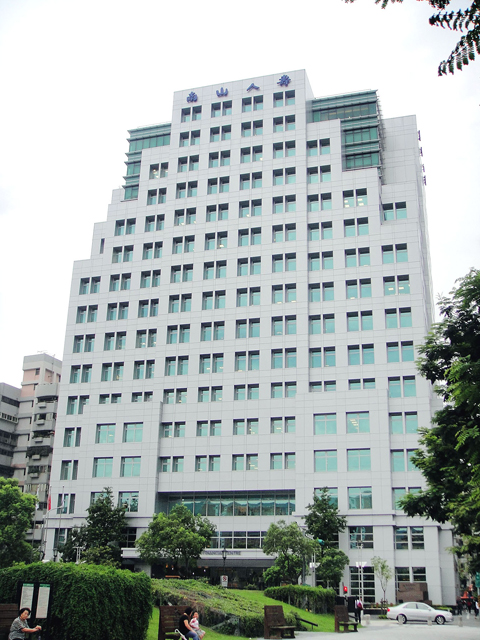More than nine interested parties have expressed their interest in bidding for Nan Shan Life Insurance Co (南山人壽), sources said yesterday.
The wide interest in Nan Shan Life, which is 97.5 percent owned by the financially troubled American International Group Inc (AIG), is likely to drive its price up to nearly NT$80 billion (US$2.43 billion) from the US insurer’s floor price of US$2 billion, a source said.
The deal is expected to close in September.

PHOTO: Liao Chien-ying, TAIPEI TIMES
“Some of the interested parties may have formed joint ventures to submit a joint bid,” he said.
Among the contenders, Chinatrust Financial Holding Co (中信金控) is probably the most suitable candidate since it lacks an insurance subsidiary, an analyst who requested anonymity said.
Nan Shan has hired Morgan Stanley, which has a 4.01 percent stake in Chinatrust Financial, to arrange its sales, the analyst said.
“But I don’t think it will be a good deal if the price [for Nan Shan] closes at around NT$80 billion,” the analyst said.
Although Cathay Financial Holding Co (國泰金控) and Fubon Financial Holding Co (富邦金控) — already the two largest domestic life insurers — have both expressed an interest in Nan Shan, the analyst said the two were likely to back out because of the lack of synergy as well as the risk and cost of managing overlapping policyholders and agents from Nan Shan.
The analyst said potential buyers should “be aware” that purchasing Nan Shan would be the “easy” part, but managing it would be “difficult.”
He added that share dilution and possible layoffs of Nan Shan’s “costly” agents were two hot potatoes that would likely keep Fubon Financial and Cathay Financial out of the deal.
Nan Shan has a sales force of about 35,000 serving 4 million policyholders. It has 24 branches and 427 sales offices nationwide.
Other potential contenders include Ruentex Group (潤泰集團) and private equity (PE) funds such as Carlyle Group, Primus Financial Holdings Ltd, MBK Partners Ltd, KKR & Co and Affinity Equity Partners Ltd, the source said yesterday.
Local media speculated that Ruentex could team up Carlyle or BlackRock Inc to compete head-to-head with Chinatrust Financial.
However, Financial Supervisory Commission Chairman Sean Chen (陳冲) said the financial regulator “does not welcome PE fund buyers if they are aiming for quick gains [out of the deal]” rather than long-term holding.
But he added that not all PE funds were vultures and his commission would take the prospective buyer’s track record into consideration when reviewing their applications.
Although the banker-turned chairman doesn’t object to the idea of PE funds borrowing loans from local banks to buy up Nan Shan, he advised local banks to carefully evaluate the credit risk of extending such loans.

Japanese technology giant Softbank Group Corp said Tuesday it has sold its stake in Nvidia Corp, raising US$5.8 billion to pour into other investments. It also reported its profit nearly tripled in the first half of this fiscal year from a year earlier. Tokyo-based Softbank said it sold the stake in Silicon Vally-based Nvidia last month, a move that reflects its shift in focus to OpenAI, owner of the artificial intelligence (AI) chatbot ChatGPT. Softbank reported its profit in the April-to-September period soared to about 2.5 trillion yen (about US$13 billion). Its sales for the six month period rose 7.7 percent year-on-year

CRESTING WAVE: Companies are still buying in, but the shivers in the market could be the first signs that the AI wave has peaked and the collapse is upon the world Taiwan Semiconductor Manufacturing Co (TSMC, 台積電) yesterday reported a new monthly record of NT$367.47 billion (US$11.85 billion) in consolidated sales for last month thanks to global demand for artificial intelligence (AI) applications. Last month’s figure represented 16.9 percent annual growth, the slowest pace since February last year. On a monthly basis, sales rose 11 percent. Cumulative sales in the first 10 months of the year grew 33.8 percent year-on-year to NT$3.13 trillion, a record for the same period in the company’s history. However, the slowing growth in monthly sales last month highlights uncertainty over the sustainability of the AI boom even as

AI BOOST: Next year, the cloud and networking product business is expected to remain a key revenue pillar for the company, Hon Hai chairman Young Liu said Manufacturing giant Hon Hai Precision Industry Co (鴻海精密) yesterday posted its best third-quarter profit in the company’s history, backed by strong demand for artificial intelligence (AI) servers. Net profit expanded 17 percent annually to NT$57.67 billion (US$1.86 billion) from NT$44.36 billion, the company said. On a quarterly basis, net profit soared 30 percent from NT$44.36 billion, it said. Hon Hai, which is Apple Inc’s primary iPhone assembler and makes servers powered by Nvidia Corp’s AI accelerators, said earnings per share expanded to NT$4.15 from NT$3.55 a year earlier and NT$3.19 in the second quarter. Gross margin improved to 6.35 percent,

FAULTs BELOW: Asia is particularly susceptible to anything unfortunate happening to the AI industry, with tech companies hugely responsible for its market strength The sudden slump in Asia’s technology shares last week has jolted investors, serving as a stark reminder that the world-beating rally in artificial intelligence (AI) and semiconductor stocks might be nearing a short-term crest. The region’s sharpest decline since April — triggered by a tech-led sell-off on Wall Street — has refocused attention on cracks beneath the surface: the rally’s narrow breadth, heavy reliance on retail traders, and growing uncertainty around the timing of US Federal Reserve interest-rate cuts. Last week’s “sell-off is a reminder that Asia’s market structure is just more vulnerable,” Saxo Markets chief investment strategist Charu Chanana said in